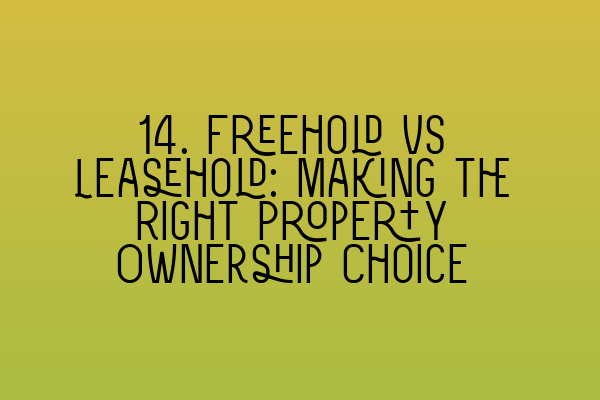14. Freehold vs Leasehold: Making the Right Property Ownership Choice
When it comes to buying a property, one of the key decisions you need to make is whether to opt for a freehold or leasehold ownership. Understanding the differences between these two types of property ownership is essential to ensure that you make the right choice for your circumstances. In this article, we will delve into the nuances of freehold and leasehold ownership, examine their advantages and disadvantages, and equip you with the knowledge you need to make an informed decision.
Freehold Ownership: Complete Control and Independence
Let’s start with freehold ownership. When you buy a freehold property, you become the outright owner of both the property and the land it stands on. This means you have complete control over everything related to the property, from making structural changes to renting it out or even selling it. Freehold ownership offers you a sense of independence and permanence, as you don’t have to renew any leases or seek permission from any landlords.
One of the key advantages of freehold ownership is the absence of ground rent. Unlike leasehold properties, there is no ongoing financial burden in the form of ground rent payments. Additionally, freehold properties tend to be more attractive to potential buyers due to the perceived value of owning the land outright.
However, with great power comes great responsibility. As the owner of a freehold property, you are solely responsible for the maintenance and repair costs of the property, including any communal areas if applicable. Depending on the size and condition of the property, this can be a significant financial commitment. It is therefore crucial to consider your financial situation and long-term plans before committing to a freehold property.
Leasehold Ownership: Understanding Terms and Restrictions
On the other hand, leasehold ownership involves owning a property for a set period of time, typically long-term leases ranging from 99 to 999 years. While you do not own the land the property stands on, you have the right to occupy and use the property within the terms of the lease agreement.
Leasehold ownership often applies to flats, apartments, and certain types of houses, particularly those in developments with shared spaces and amenities. It offers a more affordable option for potential buyers, as the initial purchase price is generally lower than that of a freehold property.
It is important to note that leasehold ownership comes with certain restrictions and obligations. You will have to pay an annual ground rent to the freeholder and potentially a service charge for the maintenance of communal areas. These ongoing costs should be factored into your budgeting when considering a leasehold property.
Another aspect to be aware of is the lease length. As the lease term dwindles, the property’s value may decrease, making it more challenging to sell in the future. Extending the lease can be a complex and costly process, so it is essential to carefully review the lease terms and seek professional advice if necessary.
Making the Right Choice: Factors to Consider
Now that we have explored the basics of freehold and leasehold ownership, let’s look at some factors to consider when making your choice:
1. Financial Considerations: Determine your budget, taking into account not just the purchase price but also ongoing costs such as ground rent, service charges, and maintenance.
2. Long-Term Plans: Consider your future plans for the property. If you plan to make significant changes or alterations, freehold ownership may provide more flexibility.
3. Property Type: Different types of properties are more commonly associated with either freehold or leasehold ownership. Understanding the norm for the property type you are interested in can help guide your decision.
4. Lease Terms and Conditions: Carefully review the lease agreement, paying attention to lease length, ground rent, service charges, and any restrictions or covenants that may impact your use of the property.
5. Future Resale Value: Consider the impact of lease length and other leasehold obligations on the property’s resale potential.
Professional Advice: A Wise Decision
Given the complexities involved in property ownership choices, seeking professional advice is always a wise decision. Solicitors specializing in property law, like us at SQE Property Law & Land Law, can guide you through the process, ensuring that you have a thorough understanding of your rights and obligations.
At SQE Property Law & Land Law, we offer expert advice and support to buyers and sellers navigating the intricacies of property ownership. Whether you are considering a freehold or leasehold property, our team of experienced solicitors is ready to assist you every step of the way.
In summary, the choice between freehold and leasehold ownership depends on your individual circumstances and priorities. By carefully examining the advantages and disadvantages of each, considering your financial situation and long-term plans, and seeking professional advice, you can make the right choice that aligns with your needs and aspirations.
To enhance your knowledge further, check out our related articles:
– SQE 1 Practice Exam Questions
– SQE 1 Practice Mocks FLK1 FLK2
– SQE 2 Preparation Courses
– SQE 1 Preparation Courses
– SRA SQE Exam Dates
